The 20 Best Rick And Morty Episodes, Ranked
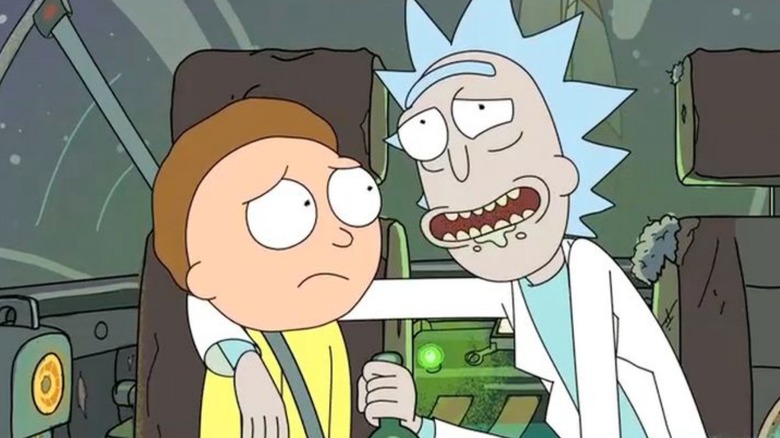
When it premiered on Adult Swim in 2013, "Rick and Morty" spliced together science fiction, comedy, and pure imagination into an explosive, disturbing, and side-splitting cosmic cocktail. What started as a crude "Back to the Future" parody has become a high-concept animated series full of low humor, one that follows the alcoholic and abrasive mad scientist Rick as he drags his grandson, Morty, on high-octane adventures across alternate dimensions. Created by Dan Harmon ("Community") and his buddy Justin Roiland (the voice of the eponymous pair), "Rick and Morty" is one of the best adult cartoons on the air right now.
There's no end to the interdimensional hijinks that the grandfather, grandson, and the rest of the Smiths get up to in "Rick and Morty," but it's not all funny. Even as it pushes the boundaries of the sci-fi genre, the series' drama is anchored by the deep domestic dysfunctions and emotional wounds that characterize the scientist's family. The best episodes of the show are a mix of sci-fi ingenuity, hilarity, and interpersonal conflicts, and we've scoured every installment — of those that have aired so far, anyway — to identify the episodes that exemplify this unique combination.
The Ricks Must Be Crazy (Season 2, Episode 6)
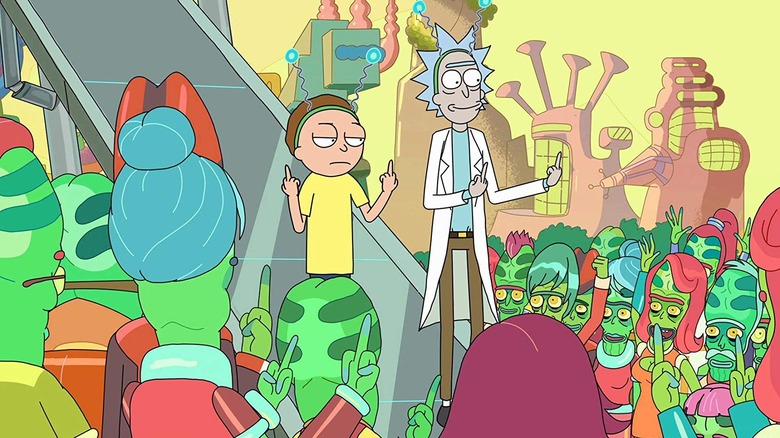
The gags in "The Ricks Must Be Crazy" thrive on the molecules of its micro-ideas. A mini-verse powers the battery of Rick's ship, so when the battery phases out, Rick and Morty shrink themselves, travel to the mini-verse, and meet its alien denizens, whose physical labors power the battery (yes, Morty calls out this "slavery with extra steps"). Rick is chagrined to learn that the aliens have stopped working thanks to the scientist Zeep Zanflorp (snarkily voiced by Stephen Colbert), who has invented his own battery — one that also runs on its own mini-universe.
"The Ricks Must Be Crazy" contains one of those golden scenarios in which Rick is challenged by a loss of control; in this case, that's his own creations, including Zeep, finding the will to challenge him. "The Ricks Must Be Crazy" also features one of the series' most harrowing b-stories: Morty's older sister, Summer, is locked in the ship, and its overzealous AI is so hellbent on protecting her that its machinations result in casualties. As always, "Rick and Morty" makes a simple concept radioactive using both horror and comedy.
One Crew Over The Crewcoo's Morty (Season 4, Episode 3)
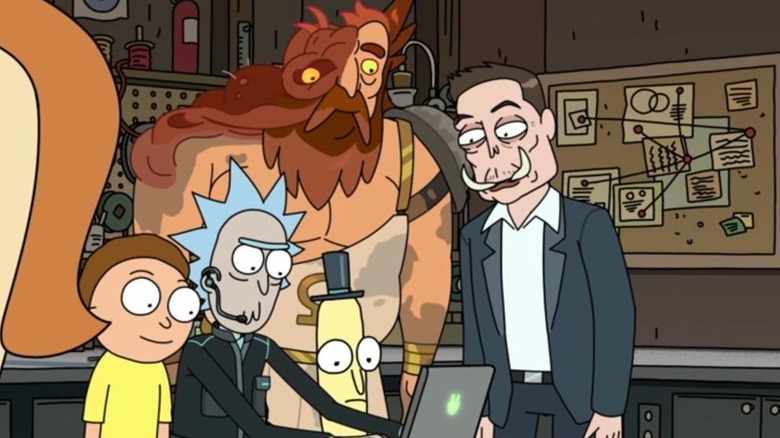
Rick may be full of complaints about how heist movies are filled with cliches, and yet his schemes in "One Crew over the Crewcoo's Morty" tap into the best parts of that genre and infuse it with the show's unique brand of zaniness. Put simply, George Clooney's got nothing on Rick Sanchez and his inventions.
Upon discovering that a coveted treasure has been already pilfered, Rick constructs a device called the Heist-o-Tron that runs algorithms (based on the "Ocean's Eleven" franchise) to plan the perfect heist. However, when the machine begins to over-heist, it's up to Rick and Morty to outwit it with help from another one of Rick's inventions, the Rand-o-Tron. You can likely guess the outcome of this switch-a-roo, but the fun of this episode is that it understands that the atmosphere matters more than judging a genre's well-worn tropes.
Mortyplicity (Season 5, Episode 3)
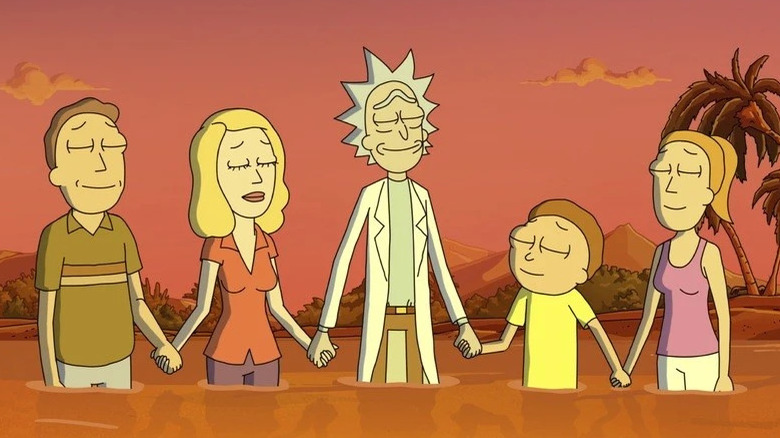
"Rick and Morty" loves to make its characters question whether or not they're even real. In "Mortyplicity," it's revealed that Rick has built a decoy family just in case he and the Smiths are assassinated. But the fake family has also built its own set of decoys, which has built its own set of decoys, which ... well, you get the drift.
Anyway, all these different groups of decoys are now at war, and this chaotic scenario quickly becomes less about figuring out which Smith family is the "real" one and more about witnessing the bloodbaths that ensue. Everything is complicated by the fact that each decoy thinks it's the real person, too. As you can guess, it's a tangled web, especially since each manufactured family only has a vague understanding of what's happening with the other units.
Obviously, the writers won't kill the real Rick and Morty, and the episode is weaker for it, especially in comparison to status-quo defying installments like "Rick Potion #9." Still, there's some wicked fun to be had in watching all the decoys scramble for survival. Many of the decoys differ from the others by a few degrees, and they have a variety of entertaining reactions, including fleeing from their fates, finding peace in death, and unifying other decoys into a rebel cult. The best decoys, though, are the ones who dress as Muppet-styled Smiths in order to make themselves "too cute" to kill off.
Lawnmower Dog (Season 1, Episode 2)
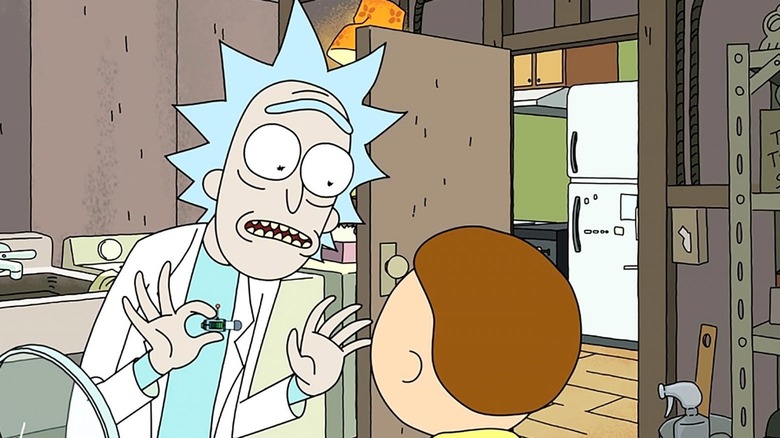
If there's anything that Rick excels at, it's coming up with complicated solutions to simple problems. The family dog, Snowball, is peeing on the carpet? Make him an IQ helmet. Morty needs a better grade in math? Venture into Morty's math teacher's dreamscape, a la "Inception," to subconsciously persuade him to give Morty an A. Logical, right? Of course, Morty's teacher's subconscious is remarkably depraved, and if Rick or Morty die in a dream, they die in real life, too. Oops! Meanwhile, in the real world, Snowball weaponizes his augmented IQ to subjugate his beleaguered human owners.
The clever realm-hopping in "Lawnmower Dog" epitomizes the series' approach to science fiction concepts, with rules that are robust enough to easily comprehend, but screw-loose enough to let the show run wild. "Lawnmower Dog" might be the second episode of "Rick and Morty," but it's clear that this then-new cartoon already has all its creative juices flowing. There's some weird heart to be found here, too, including the titular pair befriending a Freddy Krueger knockoff who was out to slash them, and Snowball surrendering his bid for conquest to save the human he loves.
Rixty Minutes (Season 1, Episode 8)
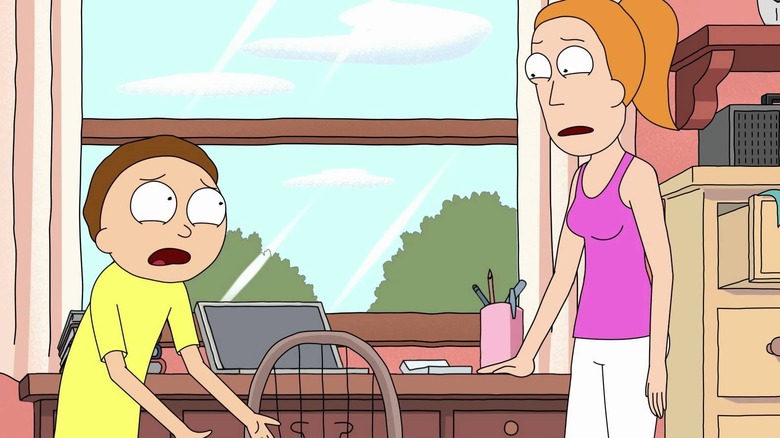
There's a point in "Rixty Minutes" where you can hear Justin Roiland explode into laughter in the voice booth, as if the absurdity of his improvised lines have jackhammered through his deadpan professionalism. It's a conspicuous outtake that the animators decided to keep. That represents the charm of the improvisatory nature of "Rixty Minutes," which ended up being tough act to follow when the anthology formula was re-applied in later seasons.
In "Rixty Minutes," Rick introduces the Smiths to Interdimensional Cable, allowing them to view zany shows that defy the normalcy of typical Earth programming. There are commercials about fake doors, a loquacious trailer for an action movie, a bloody riff on a Lucky Charms commercial, and an alien version of "Garfield." It's an excuse for the animators, as well as Roiland, to flaunt their nonsensical imaginations, and Roiland is clearly having a ball with the improvisatory freedom. The Smiths also face a family crisis when Beth and Jerry discover that their lives may have gone better if they hadn't married.
But for all the frivolity, there is a point to the pointlessness. In a bold creative decision, this is the first time that Morty acknowledges, both to himself and his "new" sister, Summer, that he really isn't living in his original universe (for more on that, see "Rick Potion #9"). And yet, Morty still thinks that this life is worth living, and that time-wasters like watching Interdimensional Cable with his new family are a meaningful way to pass the time.
Mortynight Run (Season 2, Episode 2)
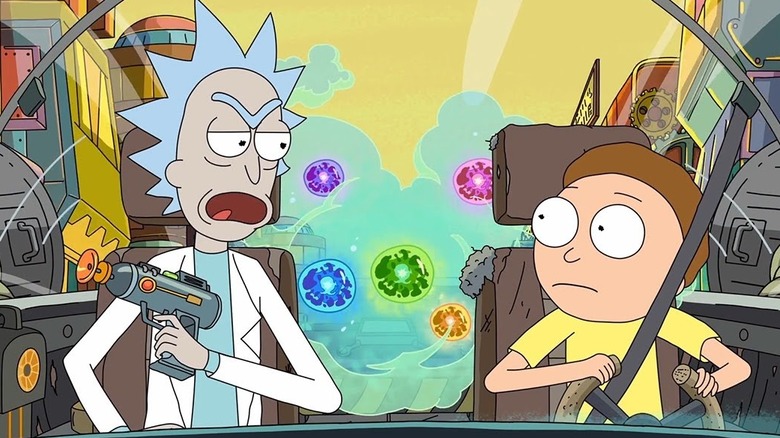
"Mortynight Run" balances a personal triumph for Morty with a tragic realization. Morty believes in doing the right thing. It's what makes him a great foil for the more nihilistic Rick. As such, the events of "Mortynight" are markedly bittersweet, as Morty attempts to live up to his morals whether or not Rick approves. It begins when Morty liberates a gassy sentient entity that he calls Fart (voiced by the suave Jemaine Clement) without really knowing why Fart is locked up. Despite disagreeing, Rick helps Morty try to get Fart to safety.
"Mortynight Run" must show how much Rick cares about Morty while also honoring Morty's yearning to make decisions independent of Rick's demands. When Fart reveals his true intentions, Morty forces himself to make a decision that breaks his own heart. It's a decision done out of Rick's sight, just so that Morty can completely own it.
Meanwhile, Jerry is taken to a daycare for Jerrys from various dimensions, and sees just how easily he cowers when subjected to the whims of a cruel galaxy. "Mortynight Run" is a sneakily generational story about Jerry and Morty, who are both trying to understand their own limits when it comes to both Rick and the world as a whole.
The Wedding Squanchers (Season 2, Episode 10)
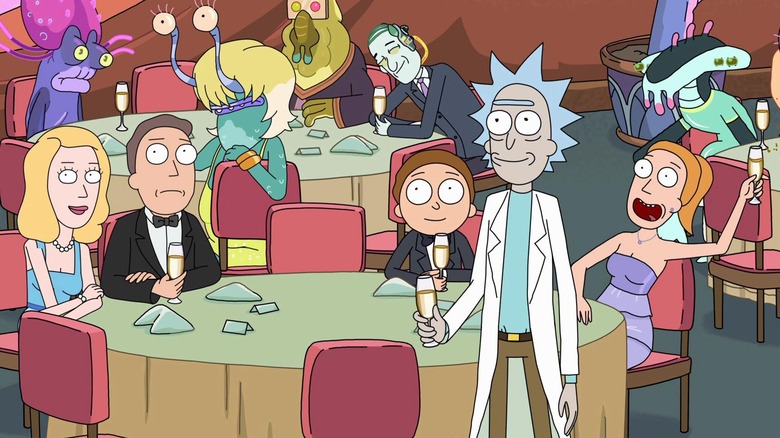
Weddings are an occasion for happiness ... and bloodshed. Rick and his family are invited to the wedding of Rick's bestie, Birdperson, and Tammy. Despite his initial malaise about going, Rick summons all the sincerity he can and tries to enjoy the wedding. His optimism evaporates, however, with a gunshot. What was supposed to be a joyous day of union dissolves into a bloodbath that claims the life of Rick's best friend, forcing Rick and the Smiths to search for a planet to hide out on.
It's both fascinating and depressing to witness Rick try to be a provider and protector for his family. As much as Rick prides himself on his guarded abrasiveness, he hasn't forgone attachments. The violence at the wedding is shocking, but not as crushing as Rick's final actions. To the surprise chords of Nine Inch Nails' "Hurt," Rick concedes that he deserves to be put in a Federation prison for the sake of his family — without letting his family know. Yes, next season Rick claims that he has ulterior motives, but he's sincere about wanting to save his family from both the galaxy and himself. That's why the final shot cuts like a knife: Rick can barely admit that he cares this much.
Mort Dinner Rick Andre (Season 5, Episode 1)
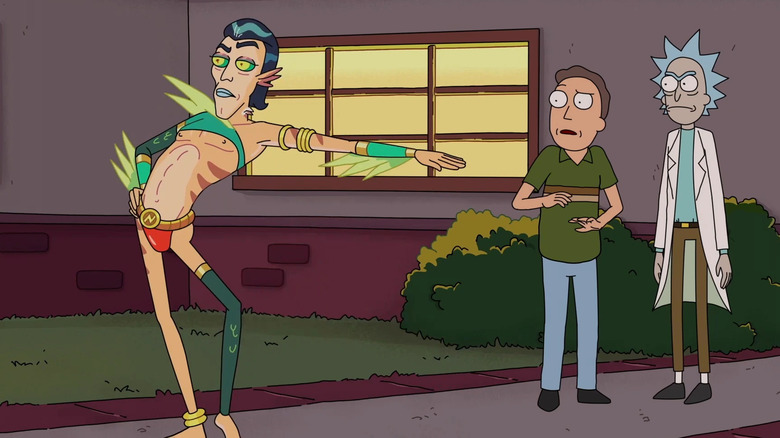
Rick's dinner with the sexy sea ruler Mr. Nimbus is less about Rick preventing a geopolitical war and more about exploring his feelings of inadequacy. To impress Nimbus, Rick tells Morty to make some fine wine by stashing the beverage in a dimension that runs on "Narnia time" — basically, that's a world where time runs faster, so the wine will age into its ideal form. However, during successive attempts to attain the wine, Morty meets the anthropomorphic, hound-like Hoovies who live in that dimension. It begins as an innocuous encounter, but some mishaps and miscommunications sour Morty's relationship with the first Hoovy he meets.
Mr. Nimbus is a hilarious foe, one of the few who sees through Rick's facade, but what makes this episode really special is one of the show's most sprawling set-pieces. If you want to see how the "Rick and Morty" writers can expediently build an entire world around a simple gag, "Mort Dinner Rick Andre" has the perfect example. Every time that Morty re-enters the Narnia dimension, hundreds of years have passed, and as the Hoovies' civilization progresses from medieval to futuristic, "Rick and Morty" toys with genre cliches. To the Hoovies, Morty is the scourge, the prophesied dragon, the assassin, the alien. Within a few minutes, we witness a millennium's worth of evolution on the Hoovy world. It's quite a feat for a 24-minute episode.
The Ricklantis Mixup (Season 3, Episode 7)
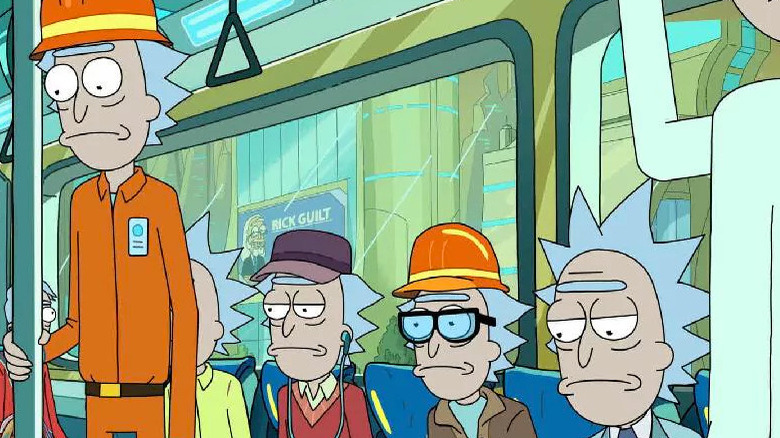
In "The Ricklantis Mixup," Rick and Morty embark on an oceanic adventure to Atlantis. But wait! This episode is not about their enticing escapade, but rather the adventures of the other Ricks and Mortys, who were impacted by our Rick's destruction of the Citadel. "The Ricklantis Mixup" follows some Rick-less Mortys who spend a last summer together, a Rick-and-Morty cop duo, a blue-collared Rick who's consigned to make wafers in a factory, and the Morty running for Citadel president. These come with some shake ups to the formula that drives the show. We witness one Morty who's more controlling than his Rick, for example, and a nicer, good-natured Rick.
It's nice to move away from our familiar Rick and Morty and take a glimpse at some other lives. It reminds us that the galaxy will keep rolling on without the show's key pair, and that they don't just impact events; sometimes, events impact them. Although they're not our Rick and Morty, watching the protagonists' interdimensional counterparts opens up a spectrum of possibilities. Change is coming to the Citadel, and it's not necessarily for the better.
Rickternal Friendshine Of The Spotless Mort (Season 5, Episode 8)
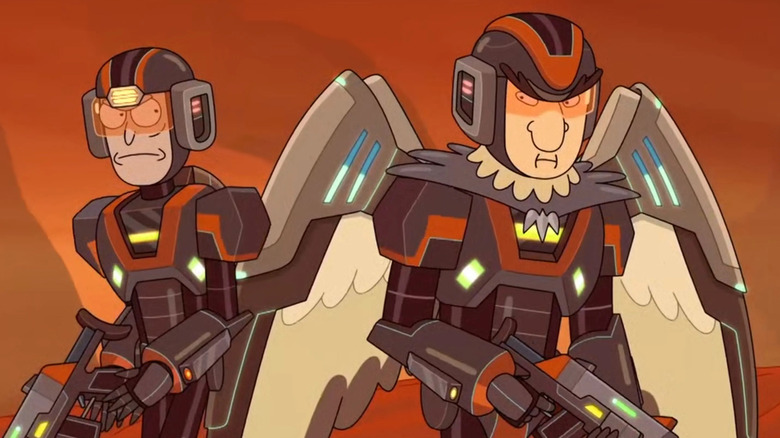
It's time for Rick to go on a Charlie Kaufman-esque journey without Morty. To recover the brainwashed, cybernetic Birdperson, Rick travels into his best friend's memoryscape, where he encounters a "nicer" version of himself.
Birdperson is one of Rick's few gracious friends, so, naturally, he imagines Rick as being more mellow than he actually is. Up until this point, Rick's friendship with Birdperson has been a series-long point of curiosity. Why is Birdperson willing to cut a morally lax person like Rick so much slack? What ultimately drove the two friends apart? How much does Birdperson really mean to Rick?
Much of the episode's hilarity is derived from the limitations of Birdperson's memoryscape, but "Rickternal Friendshine" also reckons with the relationship between Birdperson and Rick, and the idea that the real Rick can't live up to Birdperson's idealized recollection. As a result, it's quite satisfying when the resurrected Birdperson ends up being more adamant about setting boundaries. Birdperson has a soft spot for Rick, but this mindscape adventure warns both him and us against romanticizing this aspect of Rick's life.
Star Mort Rickturn Of The Jerri (Season 4, Episode 10)
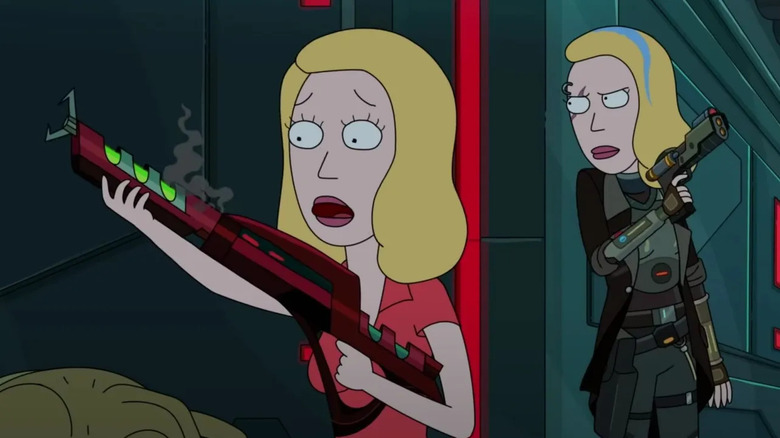
"Star Mort Rickturn of the Jerri" is not the first time that the show has reminded us that Rick is a loathsome anti-hero and crummy dad, but boy, does he face the music at the end of this season finale. Back in "The ABCs of Beth," Rick offered to make Beth a clone to assume the real Beth's place, so that our Beth could live out her dreams and venture into the stars, unburdened by her long-lasting domestic frustrations. But that moment raised a question that still lingers: Are the Smiths hanging out with the original Beth, or the clone?
Don't expect a clear-cut answer here, because "clear cut" ain't the point of this show. Rather, the point is Rick's cowardice when he was entrusted with Beth's decision, and how he wiggled out of it by creating more chaos and uncertainty. The consequences of Rick's actions arrive when Space Beth — who may be the original Beth, or who may be a clone — discovers that Rick might have inserted an explosive chip inside of her. Things escalate from there.
The final episode of season 4 boasts a jam-packed, action-heavy finale in which Rick fights his own best friend, a cyborgized Birdperson (now called Phoenixperson), and the Smith family completes their respective arcs by performing hilariously irreverent actions. It demonstrates that Rick remains a toxic force in the Smiths' lives, but also that the family is more than capable of acting independently of him.
Rickmurai Jack (Season 5, Episode 10)
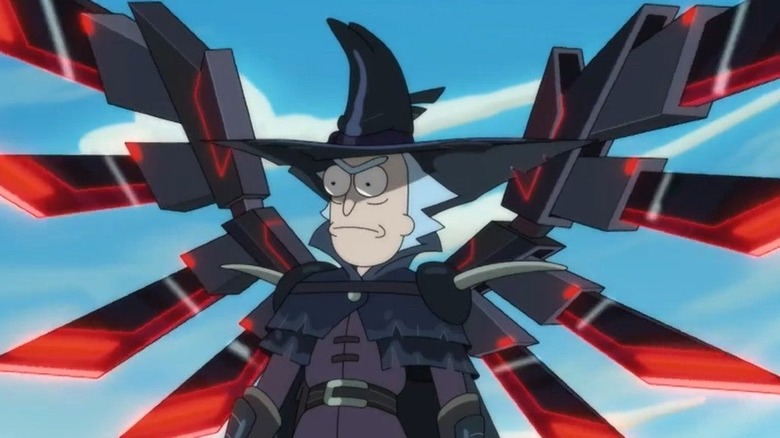
With Rick's interdimensional portal gun, the possibilities for "Rick and Morty" seemed infinite, but now we realize how limited the potential actually is. "Rickmurai Jack" spells it all out for us. Kicking off with an homage to the classic animated series "Samurai Jack," matters take a serious turn when the pair return to the Citadel and are summoned by its president, Evil Morty.
All of that initial wackiness was a smokescreen to make the tragic reveal more jaw-dropping. Through a disquieting montage, we absorb the full extent of Rick's angsty backstory, his involvement with the Citadel, and what makes him significantly different from all the other Ricks. As it turns out, Rick set limits upon the known multiverse, putting each universe on a "curve" that ensures that all Ricks are smart and have a Morty to kick around. "Rickmurai Jack" also develops the sparingly-seen Evil Morty, who is interested in liberating the multiverse from Rick's machinations. "Rick and Morty" has more than its share of intense season finales, but none are as groundbreaking as this one.
Never Ricking Morty (Season 4, Episode 6)
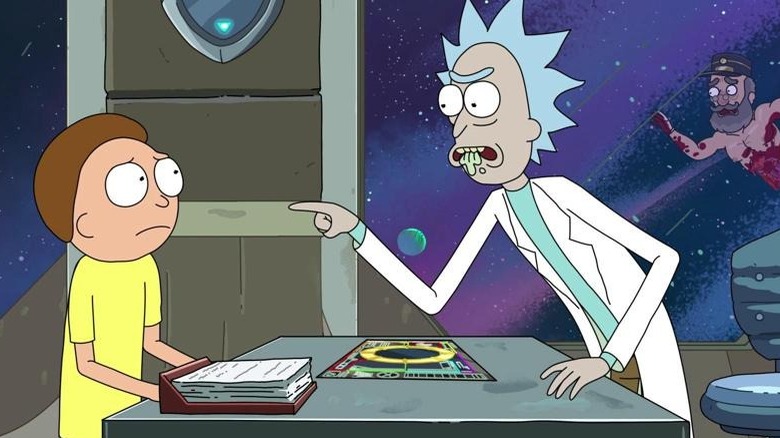
The most freeform episodes of "Rick and Morty" often yield the richest comedic crops. In "Never Ricking Morty," Rick and Morty are imprisoned in an anthology episode — or, as it's explained narratively, a "story train." The train is run by a conductor known as the Story Lord, who wants to weaponize Rick's potential for generating narratives and use it to further his own agendas.
You can never predict where this show is going to end up, and that's particularly true here. "Never Ricking Morty" plays with the show's inherent randomness, scattering the unfamiliar among the familiar in order to misdirect the audience. Rick and Morty find themselves aboard a literal plot device in the form of a galactic train that cuts away to a different story as it progresses on its journey, and must devise their own tales in order to stop it. Every episode of "Rick and Morty" has some killer gags, but "Never Ricking Morty" is an assembly line of ridiculous visuals and outcomes, and its payoff is so random that it's ingenious.
Auto Erotic Assimilation (Season 2, Episode 3)
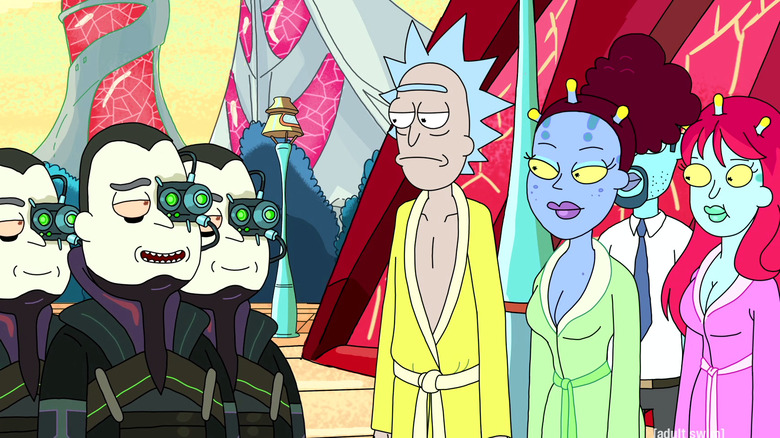
Rick Sanchez is a hedonistic black hole of a soul, and he revels in it. That way, he can ignore just how destructive he is. For their part, his loved ones know that he's toxic, but can't avoid getting caught in his ruthless gravitational pull regardless.
In "Auto Erotic Assimilation," Rick reconnects with his old flame, Unity, a hivemind that recently possessed an entire alien race. Her ultimate goal is to create a perfect society, mostly as a way to cope with her breakup. But then, Unity and Rick rekindle their romance, conjuring up all kinds of ridiculous, sex-fueled scenarios. Meanwhile, Summer's attempts to liberate the aliens from Unity's influence wreak havoc upon the planet, and Beth and Jerry's marital quarrels lead to an examination of the show's central quandary: How much of Rick's behavior is truly well-intended? Is he simply too toxic to live with? Perhaps, however, this is just a distraction, one that allows both Beth and Jerry to ignore their own toxicity.
"Auto Erotic Assimilation" shows that Rick's loved ones have to set up boundaries in order to achieve any semblance of functionality while in his orbit. It's a lesson that Rick learns, too — at the end, the inevitable breakup reminds Rick just how much of a toxic sludge he really is.
The Vat Of Acid Episode (Season 4, Episode 8)
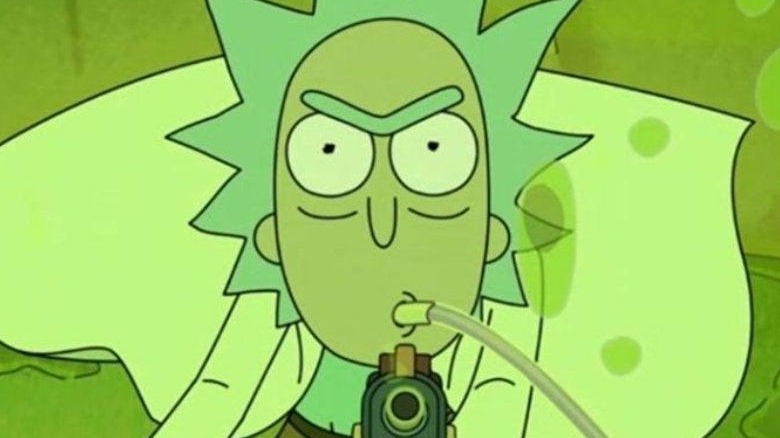
"The Vat of Acid Episode" weaponizes misdirection like knives hidden in the toe of a boot. When a deal goes south, Rick and Morty fake their deaths by jumping in a vat of (fake) acid. It's Rick's idea. Morty despises it, and the grudge that develops as a result fuels what happens next.
Just when you think you're getting a bottle episode set in a vat of acid, "Rick and Morty" throws some surprises your way. After their escapades in the vat, Rick builds Morty a remote that he claims will allow Morty to rewind time. That way, Morty can revert back to a "save point" and start over if he makes a mistake. Naturally, Morty abuses the device to get into various shenanigans, including a long courtship that unfolds in a silent, Pixar-inspired montage and ultimately descends into heartbreak, tragedy, relief, and then right back to tragedy. The episode's shift from banal goofiness to profound despair leads to some truly devastating payoffs.
The lesson of "The Vat of Acid Episode" is that a consequence-free life is not worth living, right? Well, it turns out that the device had some other consequences, too. This episode pushes the limits of just how morally demented the main characters can be, even if, as in Morty's case, their transgressions aren't deliberate.
Rick Potion #9 (Season 1, Episode 6)
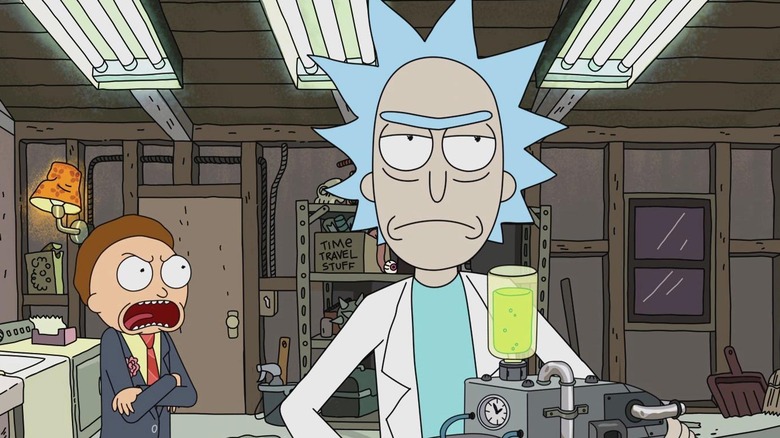
Every "Rick and Morty" viewer is acquainted with the standard rules of television: Normally, an episode must solve its self-contained problem by its conclusion. That way, the next episode can move onto a new issue without confusing people who missed an installment. However, "Rick Potion #9," which is the sixth episode of "Rick and Morty," destabilizes the entire status quo. Even in the beginning, "Rick and Morty" refused to play by the book.
"Rick Potion #9" begins with a love potion storyline, and ends with Armageddon. Thanks a lot, Morty's hormones. In a bid to win the affection of his crush, Morty uses an oxytocin-infused love serum created by Rick, but his plan goes awry when everyone at the school dance wants to mate with Morty. So, Rick builds an antidote, only to see it create mutants and, in the end, annihilate the planet.
The ending of "Rick Potion #9" is jaw-dropping, particularly for an episode that dropped around the midpoint of the show's very first season, and shows just how far Harmon and Roiland are willing to chuck regular TV conventions out the window. It's also a perfect example of the series' existentialism, epitomized by Morty's thousand-yard stare as he returns to a status quo — or a faux-status quo — that he doesn't belong in. The consequences of "Rick Potion #9" reverberate throughout the rest of the series' run, too. Eventually, Morty confesses to his new Summer that he eats within yards of his buried corpse, and at one point Morty returns to his original dimension to prove a point to his sister, reminding us all of what Morty left behind in order to survive.
Close Rick-Counters Of The Rick Kind (Season 1, Episode 10)
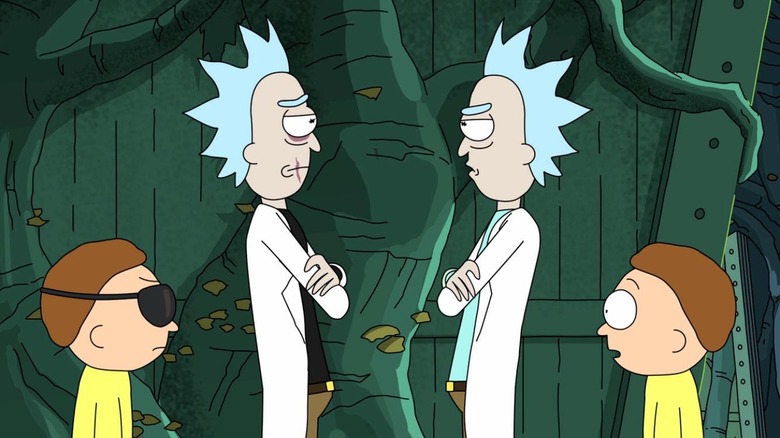
Morty is more than aware that Rick is not a hero. In fact, Rick Sanchez eventually becomes his own greatest villain. So, when our Rick faces off against a collective of Ricks from different dimensions, it's not surprising that he views them as adversaries rather than allies. In this episode, the council of Ricks, who run the Rick-founded and Rick-populated Citadel, accuse Rick of a mass murder that he didn't commit, and it's up to (our) Rick and Morty to clear (our) Rick's name and find the identity of the Evil Rick. Confused yet?
Introducing multiple dimensions of Ricks and Mortys opens up a galactic gold mine of comedic and dramatic possibilities. It's inherently delicious to pit our morally depraved Rick against a community of equally brutal Ricks, as well as his (supposedly) more murderous counterpart. Throughout the episode, Morty is frustrated with Rick's capacity for callousness, and begins to wonder how far Rick's meteoric cruelty reaches.
But is "Close Rick-Counters of the Rick Kind" really about our Rick's potential for evil? There's a clever curveball that complicates the question. Rick may be a galactic jerk, but the ending of this episode is less about the questions surrounding Rick's true nature than it is about the nefarious potential within Morty — aka, "Evil Morty," who is arguably the show's most serious threat.
Total Rickall (Season 2, Episode 4)
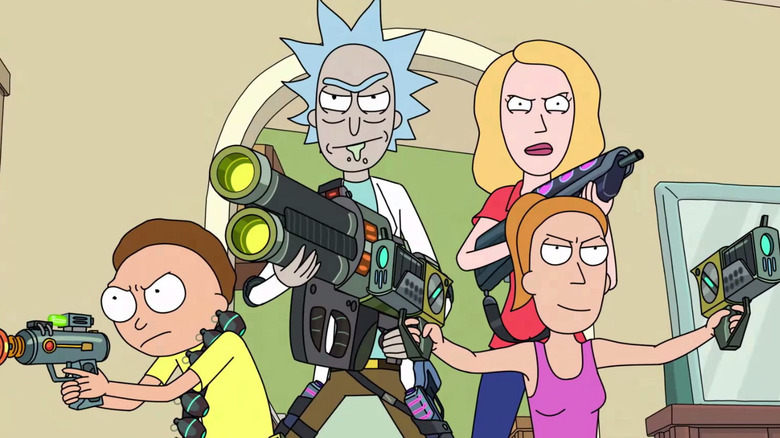
The Smith family is so starved for affection and stability that they easily fall prey to any forces that offer them the illusion of functional domesticity — for example, their goofy fun-loving uncle. Just when you think that "Total Rickall" is introducing a new Smith family member, Rick shoots and kills him. As it turns out, this kind-hearted relative never existed. It was a Memory Parasite, and now the Smith household is contaminated with them. And how do the Parasites multiply? Through "Family Guy"-style cutaway gags, of course. The Memory Parasites reproduce by assuming the shapes of quirky acquaintances, relatives, lovers, and imaginary friends, so don't flash back, or else the Memory Parasites will swarm your household, taking the form of a butler, a raptor, Frankenstein, a talking pencil, a ghost in a jar, and more.
Soon, the Smiths began questioning if they're even real, or if they're Parasites, too. As such, it's quite cathartic when Morty figures out how to sniff out the real Parasites, realizing that he has bad memories involving his real family, particularly Rick. The shared resentments among the Smiths unite them against the Parasites, and the family members find salvation by accepting that any functional relationships between them will always be an illusion. It's an epiphany that's equal parts depressing and uplifting.
A Rickle In Time (Season 2, Episode 1)
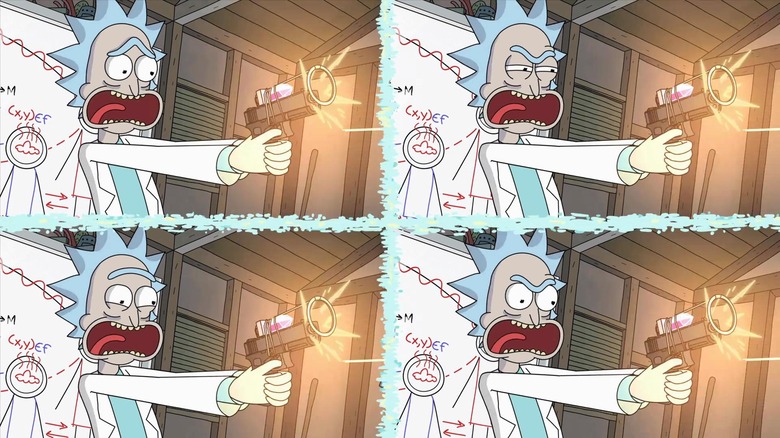
You might've assumed that, for an ambitious storyboarder, "A Rickle in Time" was an artistic dream. As it turns out, it was more like a nightmare that nearly broke the show's writers and proved "brutal" for its storyboard artists. Behind-the-scenes, "A Rickle in Time" was chaos, due largely to the countless and scattered elements at play.
This episode has to be seen to be described (see picture above to get a hint of what's in store). The season 2 premiere sees Rick, Morty, and Summer trying to undo the time freeze from the season 1 finale, but they end up ripping their realities apart, represented by split screens that show each parallel universe. Grandpa and grandkids are in a suspended Schrodinger's state (yes, Schrodinger's cats make an appearance), and the more they desync, the more timelines they create — which means more identical screens. To save them, Rick must find a way to synchronize every single timeline — but, in his paranoia, Rick also suspects that his parallel counterparts plan to assassinate him.
As a season premiere, "A Rickle in Time" nails all the character development. It reminds us of Rick's self-loathing, hidden by his cocky refusal to admit that he's thrown off his game. When Morty grumbles, "Drunk," it speaks to how Rick's insecurities are affecting him. But the sequence in which Rick proves that he will sacrifice himself for Morty is also an A-plus tearjerker, and the splitting of universes parallels the divides in Rick's own relationships, as well as his own fractured soul.
Pickle Rick (Season 3, Episode 3)
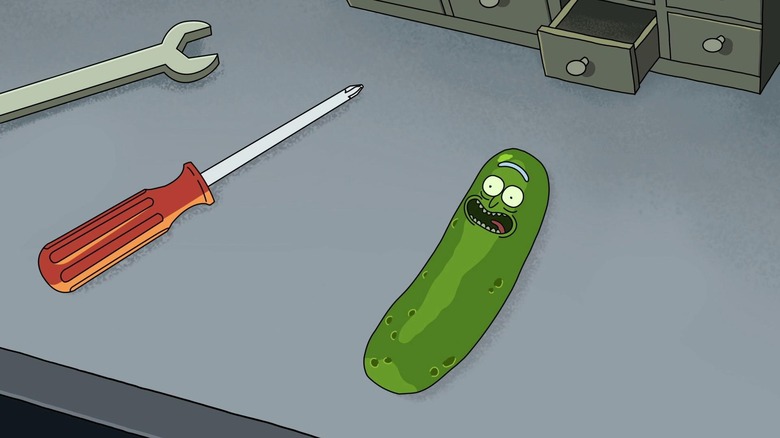
Rick Sanchez gets into a pickle? How about Rick literally becomes a pickle that gets into pickle — or a bunch of pickles? Get it?
In "Pickle Rick," Rick cooks up an ingenious plan to evade family therapy: transform into a pickle and just sit in the garage, doing nothing. But when Beth robs him of his cure, Pickle Rick finds himself rolling into mishap after mishap. He finds himself in sewers, Russian conspiracies, and skirmishes with an assassin, who's played by Danny Trejo. As he undergoes macabre transformations, Pickle Rick must rely on passing roaches and rats, whose bodies he co-opts as his own. As nauseating as it sounds, it's all a testament to how far Rick will go to cheat death, as well as the "Rick and Morty" writers' uncompromising inventiveness.
Rick's gruesome journey is just as meaningful as the destination: the sofa where Rick and the Smith family receive an epic talk from their therapist, who dissects Rick's reluctance to repair his relationships. Therapy is Rick's worst nightmare because an honest conversation will force him to dig into the vinegary innards of his denial. Given that Rick is a man who witnesses — and often instigates — death on a daily basis, perhaps it's the idea of non-lethal normalcy that frightens him so badly.
Read this next: The 15 Best Rick And Morty Villains Ranked
The post The 20 Best Rick and Morty Episodes, Ranked appeared first on /Film.
